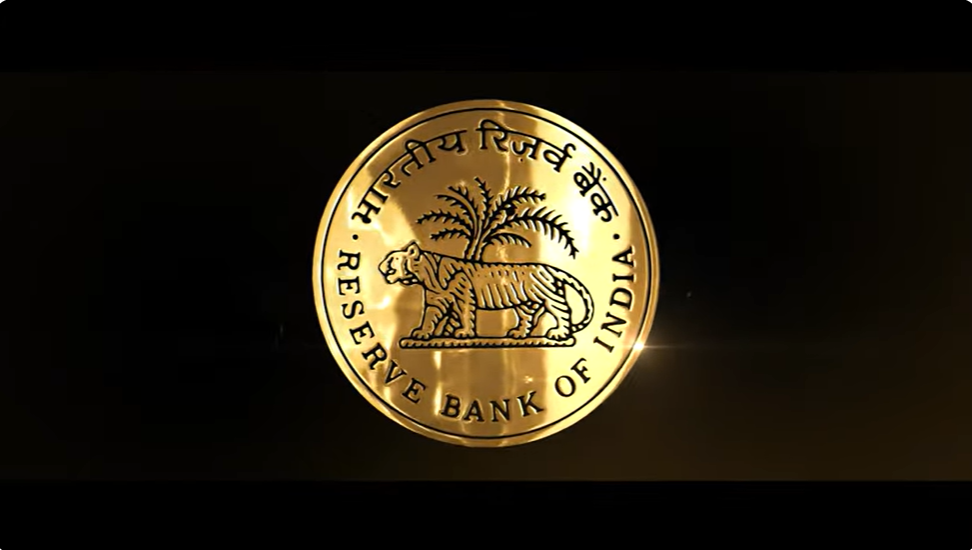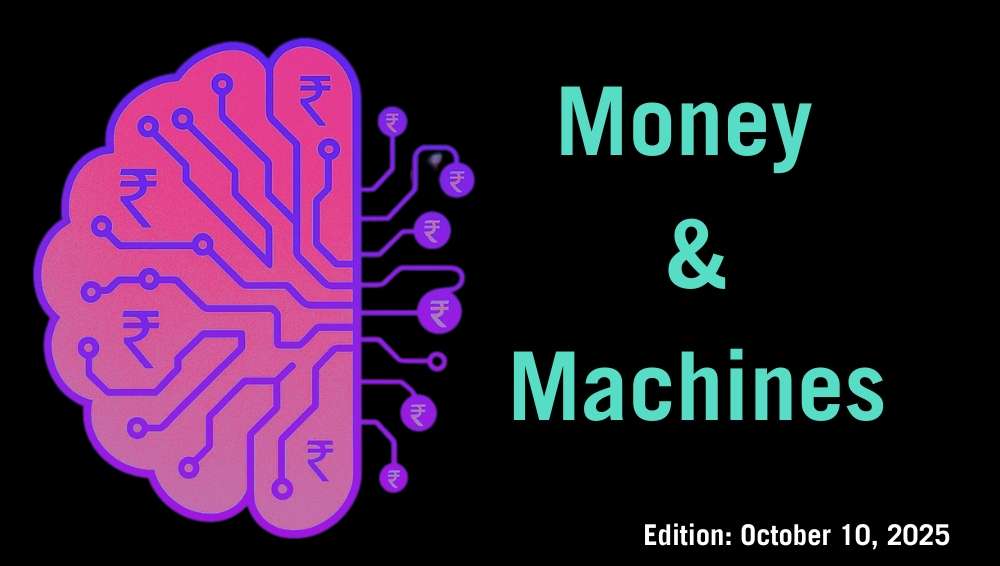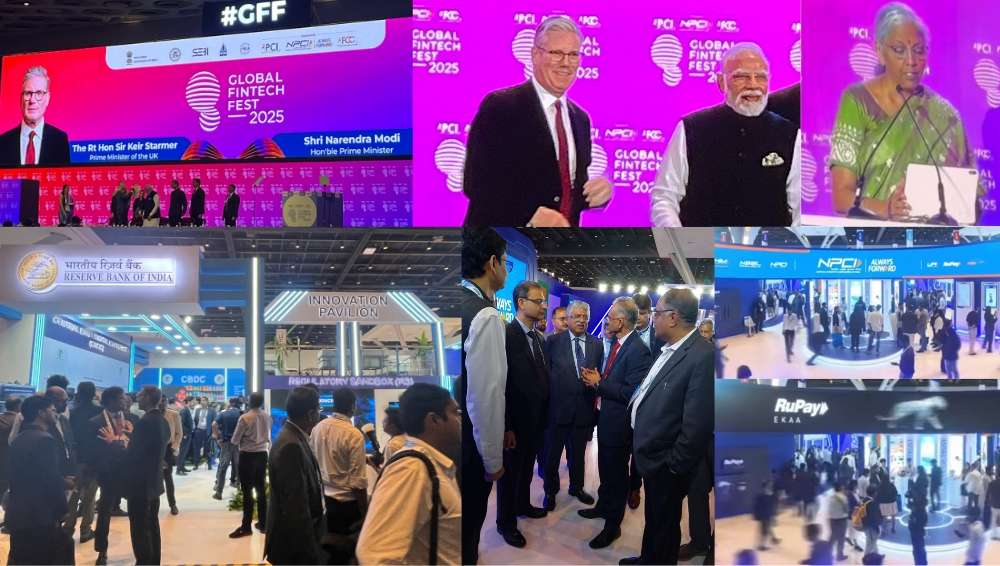

Money & Machines: Regulators, Reel Stars, Real Money. And 'All Inclusive' — Inside GFF 2025
11 Oct 2025, 01:59 PMIn today’s edition of Money & Machines, we bring to you the honest opinions, critical notes and the whispers gathered on the sidelines of biggest fintech “mela" in the world.
Joseph Rai & Arti Singh
🔥 Money & Machines
Apologies that we are dropping our weekly newsletter a day late, but we believe that it’s going to be worth your wait.
In today’s edition of Money & Machines, we bring to you not only the catchphrases from the podiums of the Global Fintech Fest spouted by policymakers, regulators and founders, but also the honest opinions, critical notes and the whispers gathered on the sidelines of biggest fintech “mela" in the world.
Regulators, Reel Stars, and Real Money — Welcome to GFF 2025
Indian fintech had its Bollywood moment in a big way at the Global Fintech Fest 2025, the world's largest event for the industry that concluded on October 9.

Hrithik Roshan, Suniel Shetty, Sanjay Dutt, and the power couple Virat Kohli and Anushka Sharma have become the new face of India's fintech boom. These celebrities are fronting names like Rugr, Zrika, Getepay, and Pay10, making GFF more star-studded than ever – not just in the halls of codes and APIs, but across giant LED screens, long panel slots, and even at the exclusive networking dinners.
But here's the odd part. Many of these companies they're endorsing were names barely known in the ecosystem – some weren't even formed a year ago. It makes you wonder if these actors have any idea what these firms actually do. Because most of them operate in the B2B payments and technology layer – the unglamorous plumbing of finance. What kind of "brand recall" can a celebrity bring to a backend API or payment switch company? Only the firms themselves can answer. But one thing's clear: the show has shifted.
That, in a way, defined this year's GFF. It was star-studded but filled with new, unfamiliar fintech names trying to look larger than life. Big, shiny stalls, expensive branding and much more.
One of my biggest takeaways: GFF 2025 felt more like a 'Regulatory Show'. The biggest stalls weren't by startups but by RBI, SEBI, and NPCI. Last year NPCI and another Reserve Bank of India-backed setup RBIH (Reserve Bank Innovation Hub) had grabbed the best spots at exhibition area and were positioned as parallel power centres – NPCI owning the payments empire (UPI) and RBIH owning the lending play (ULI).
But this year, RBI itself arrived in force (with RBIH folded into its stall, not separate). It seemed RBI wanted to step out of the shadows and remind everyone who's in charge – all under the garb of promoting CBDC (central bank digital currency).
Even within NPCI's stall, I sensed a branding shift with more focus on 'RuPay' name on branding (atleast everytime I passed through that stall, most of time I saw Rupay). If I am not wrong SEBI's presence was also new this time (if they were present last year then I missed seeing them). On the third floor, the markets regulator was present right in the centre of the ecosystem players. It was interesting to see IPO-bound Groww managing to get the stall right behind SEBI. One can't help wonder whether regulators were there to support, or subtly intimidate, fintechs and remind the industry where the boundaries lie.
Notably, foreign pavilions and global delegations (Africa, Europe, Middle East) were far less visible this year. The "global" in GFF felt a bit narrower. What did grab global headlines though was the joint appearance of Prime Minister Narendra Modi and UK Prime Minister Keir Starmer, who used the platform to announce a deeper India-UK fintech partnership.
Starmer – on his first India visit – addressed the conference and made it clear that the UK wants to be India's number one partner in fintech. He offered open invitations to Indian innovators and investors to expand in the UK. During the event, UK's Revolut announced a $670 million investment over the next five years in India.
It felt like a symbolic moment – where fintech became not just business, but diplomacy. So yes, amidst the celebrity logos and payments booths, tectonic geopolitical fintech shifts were happening.
Besides all this, off the main stage, one unverified but persistent rumour was that post the real-money gaming ban and its entanglements with banks and payment gateways, investigating agencies were silently walking through GFF floors, scrutinising booths. Could be paranoia, could be legit. Either way, it added an extra edge to the vibe.
Attendance seemed lower (or at least less frenetic) compared to past years. Some say it's because organizers stopped "free pass" giveaways; others whisper the spotlight on PM Modi + PM Starmer led to stricter access control.
Either way, GFF 2025 felt different. Less chaos, fewer global booths, more about the government. The fintech festival once known for its startup buzz now feels like it's entering a new era – where regulation, diplomacy, and showbiz share the same stage.
-by Arti Singh
Fintech’s AI Moment in India: Still Loading…
The theme this year of the Global Fintech Fest (GFF), an annual "mela" as some cynics describe it since its first edition in 2020, was "Empowering Finance for a Better World – Powered by AI: Augmented Intelligence, Innovation, and Inclusion".
The theme couldn't have been more relevant as India figures out where it stacks up in the global AI race even as the US and China are the clear frontrunners.
So, one would have expected to witness the launch of impressive, if not jaw-dropping AI innovations, from established fintechs; and some forward- looking breakthrough project announcements in the realm of AI from Prime Minister Narendra Modi.
We got neither.
Let's discuss the PM's oration first. In short, he focused on what we have already achieved in fintech and bragged about our technology (UPI) that we are sharing with other nations. On AI, he just about managed to deliver a headline worthy catchphrase – AI stands for All. Inclusive. It was more like a euphemism for – We have nothing noteworthy to show to the world on AI at the moment.
Similarly, no big bang AI-led products were unveiled at the GFF. Wait, but some would say that there was the launch of the so-called AI-powered soundbox for merchants by Paytm – India’s highly glorified fintech poster child once upon a time. However, anyone even with a basic AI knowledge wouldn’t say that the soundbox is India’s answer to AI products globally.
New fintechs also apparently didn’t bowl the investors over. “Just by attaching a – .ai – after your product name does not automatically make you an AI company,” shared an investor when asked what he thought about the startups who had set up stalls at the GFF.
Still, it wasn’t a flop show altogether. For instance, startups such as Gnani.ai, which was one of the first four firms that was selected under the government’s AI Mission, shared about the advances made by its voice AI agentic tool that is helping financial institutions collect thousands of crores of debt. “It was also great to see a bunch of startups using AI in the risk and fraud management segment,” an investor noted.
OpenAI’s partnership with the National Payments Corporation of India (NPCI) and Indian fintech unicorn Razorpay to launch agentic payments on ChatGPT was one of the highlights of the event. But one couldn’t help point out the irony that India, which has been championing ‘Swadeshi’, had to ride on an international player to pull off a domestic AI stunt.
However, an industry executive said that the jury is still out on India’s position in the AI ladder as the person noted that the government’s AI Mission will start bearing fruit in a few years from now and the pace of growth will be much faster from thereon.
Interestingly, Vishal Dhupar, managing director, South Asia, Nvidia, prophesied at the GFF that in 2028 we will be calling Mumbai, the financial capital with intelligence rather than just the finance capital.
But for now, we will have to contend with the honest and humble remarks of Paytm’s chief CEO Vijay Shekhar Sharma, “In the US, there is a gushing wind of AI innovation, while in India, the pace is much slower.”
-by Joseph Rai
This Week in Review:
Dhan turns unicorn after $120 million fundraise led by Hornbill Capital
Aagama Ventures floats Rs 400 crore fund to back fintech startups
Fintech startup Niro shuts down after raising $20 million
Amazon Pay India reports Rs 2,097 crore in FY25 revenues
Qapita secures Series B funding led by Charles Schwab
OpenAI partners with NPCI, Razorpay to launch agentic payments on ChatGPT
RBI appoints Sanjay Kumar Hansda as Executive Director
GreyLabs AI secures Series A led by Elevation Capital
Anthropic to open first office in India in early 2026
OpenAI rolls out ChatGPT Go plan in 16 more countries
SoftBank inks definitive pact to buy ABB's robotics business for $5.37 billion











